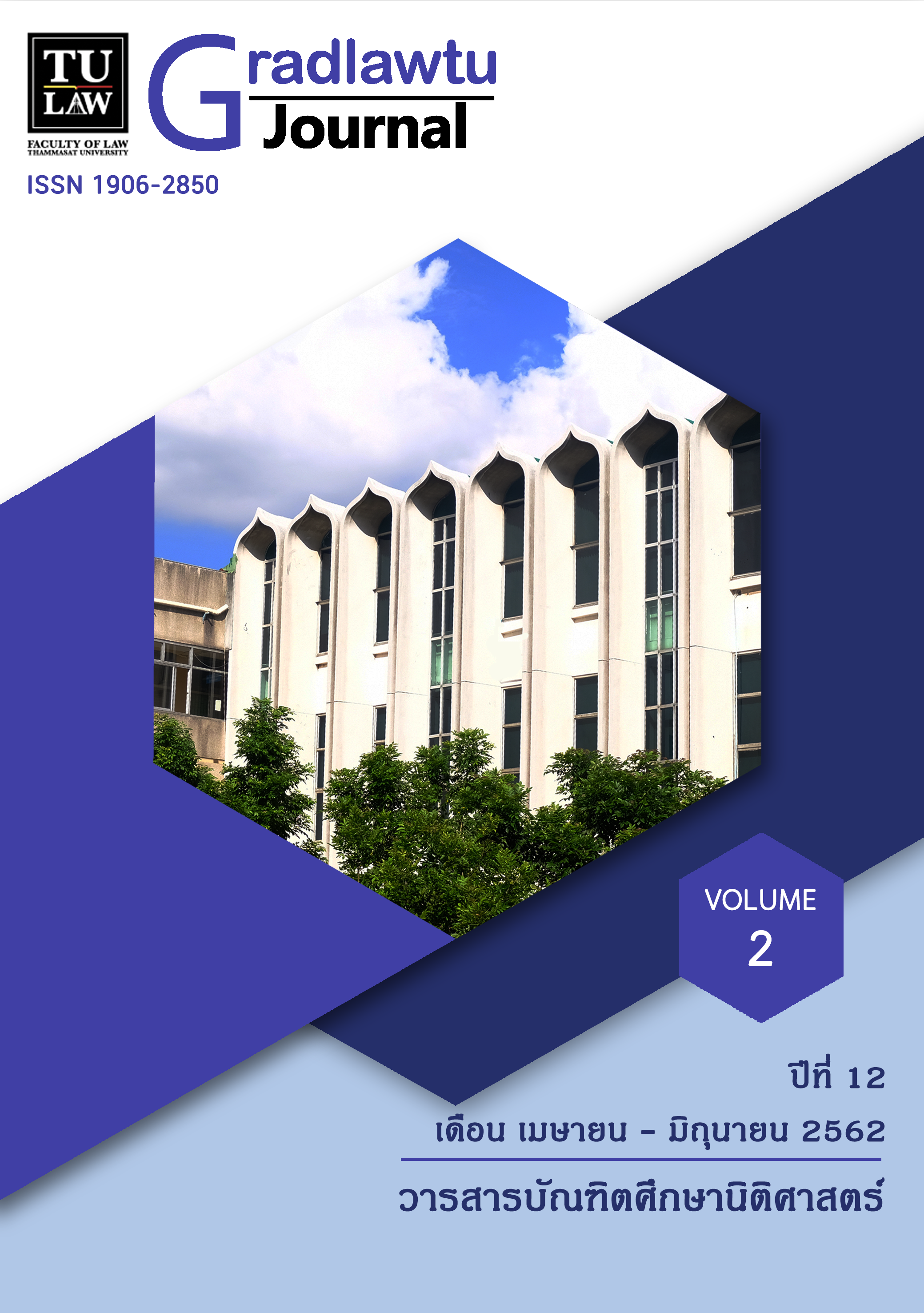CLOUD COMPUTING : RECOMMENDATIONS FOR THAI PERSONAL DATA PROTECTION ACT
Keywords:
Personal Data, Cloud Computing, Data Protection, Draft Personal Data Protection ActAbstract
Cloud Computing is a valuable technology for both business operators and individuals as it assists the businesses in IT cost reduction as well as facilitates individuals to access and manage data over the Internet everywhere. Cloud computing is also relevant to personal data due to the fact that there are a great number of personal data stored in cloud computing and, as a consequence, there is possibility and risk of cloud data leaks. To deal with this issue, various international organizations and many countries have legislated personal data protection laws and enforced such laws and regulations with cloud computing services. In Thailand, there has been only one effective data protection law so far which is “the Official Information Act 1997” applied with data in possession of the government sector. For private sector, there have been a number of drafted personal data protection laws over a long period of time. However, the lasts drafted personal data protection of Thailand is not consistent with international standard guideline and in appropriate to apply with the context of cloud computing.
References
นคร เสรีรักษ์. การคุ้มครองข้อมูลส่วนบุคคล: ข้อเสนอสำหรับประเทศไทย. กรุงเทพมหานคร: บริษัท พี.เพรส จำกัด, 2559.
จันทจิรา เอี่ยมมยุรา. “การคุ้มครองข้อมูลส่วนบุคคลในประเทศไทย.” วารสารนิติศาสตร์ มหาวิทยาลัยธรรมศาสตร์ ปีที่ 34. ฉบับที่ 4. (ธันวาคม 2547): 627.
ประสิทธิ์ ปิวาวัฒนพาณิช. “กฎหมายคุ้มครองข้อมูลส่วนบุคคลของประเทศสหรัฐอเมริกาและประเทศออสเตรเลีย.” วารสารนิติศาสตร์ มหาวิทยาลัยธรรมศาสตร์ ปีที่ 34 ฉบับที่ 4, (ธันวาคม 2547): 535.
ชินดนัย สังคะคุณ. “การจัดเก็บภาษีเงินได้นิติบุคคลจากการให้บริการของบริษัทต่างประเทศ: กรณีการให้บริการประมวลผลแบบคลาวด์”. วิทยานิพนธ์มหาบัณฑิต คณะนิติศาสตร์ มหาวิทยาลัยธรรมศาสตร์, 2558.
นัทรี เกตุแก้ว. “ความรับผิดทางแพ่งของผู้ให้บริการ Cloud Computing”. วิทยานิพนธ์มหาบัณฑิต คณะนิติศาสตร์ มหาวิทยาลัยธรรมศาสตร์, 2557.
BSA and Galexia. “ผลการประเมินความพร้อมของประเทศต่างๆ ทั่วโลก สำหรับเทคโลโยลีคลาวด์คอมพิวติ้ง โดยบีเอสเอ (BSA) ประจำปี พ.ศ. 2559 : การเผชิญหน้ากับความท้าทายใหม่.” https://cloudscorecard.bsa.org/2016/Pdf/BSA_2016_Global_Cloud_Score card_th.pdf, 10 ตุลาคม 2559.
Buyya, Rajkumar, Broberg, James Goscinski and Andrzej. Cloud computing: principles and paradigms. Hoboken, NJ: Wiley, 2011.
Chris Reed. Computer Law. Seventh Edition. New York, Oxford University Press Inc., 2011.
Christopher Kuner. European Data Privacy Law and Online Business. New York: Oxford University Press Inc., 2003.
Romansky, Radi. “Cloud Services: Challenges for personal data protection.” International Journal on Information Technologies & Security, Vol. 4, Issue 3, 2012.
BSA. “2018 BSA Global Cloud Computing Scorecard Powering a Bright Future.” https://cloudscorecard.bsa.org/2018/, 2 กุมภาพันธ์ 2561.
European Data Protection Supervisor. “The History of the General Data Protection Regulation.”https://edps.europa.eu/data-protection/data-protection/legislation /history-general-data-protection-regulation_en, 24 กุมภาพันธ์ 2560.
Downloads
Published
Issue
Section
License
บทความหรือข้อความคิดเห็นใด ๆ ที่ปรากฏในวารสารบัณฑิตศึกษานิติศาสตร์เป็นความรับผิดชอบของผู้เขียนบทความโดยเฉพาะ คณะนิติศาสตร์ มหาวิทยาลัยธรรมศาสตร์ และกองบรรณาธิการไม่จำเป็นต้องเห็นด้วย



